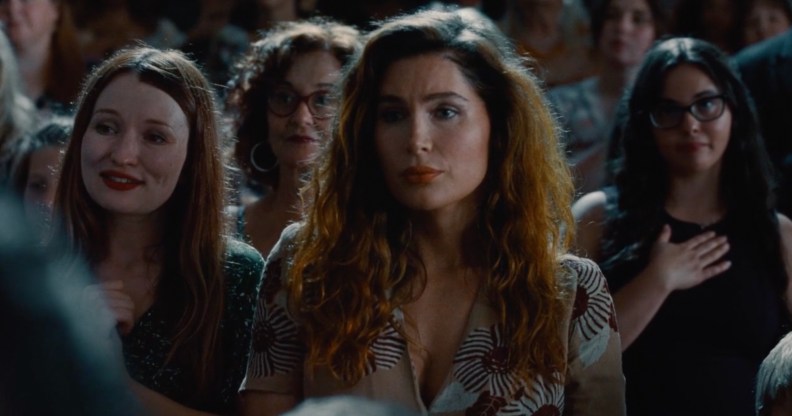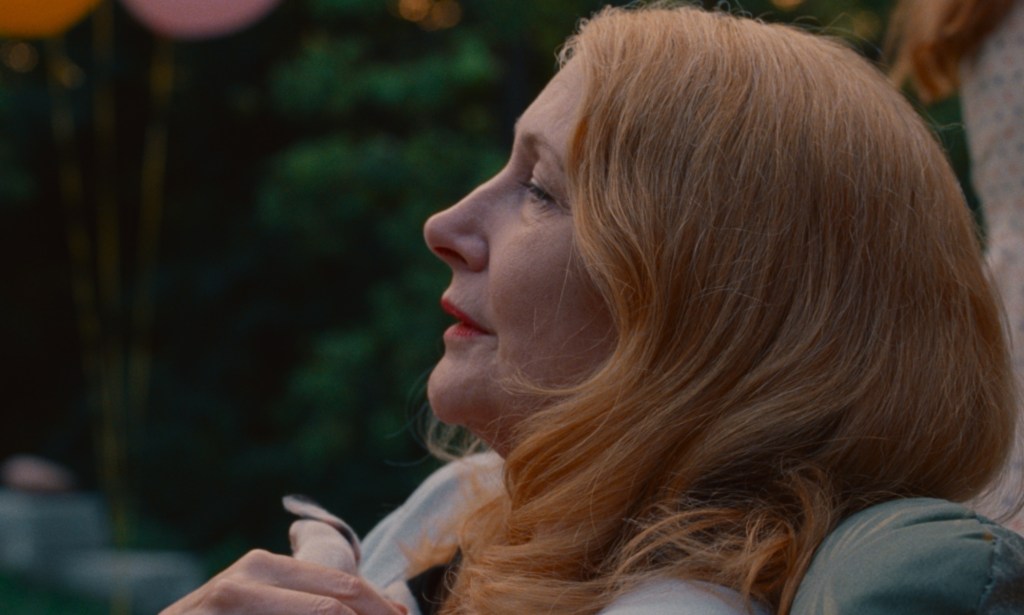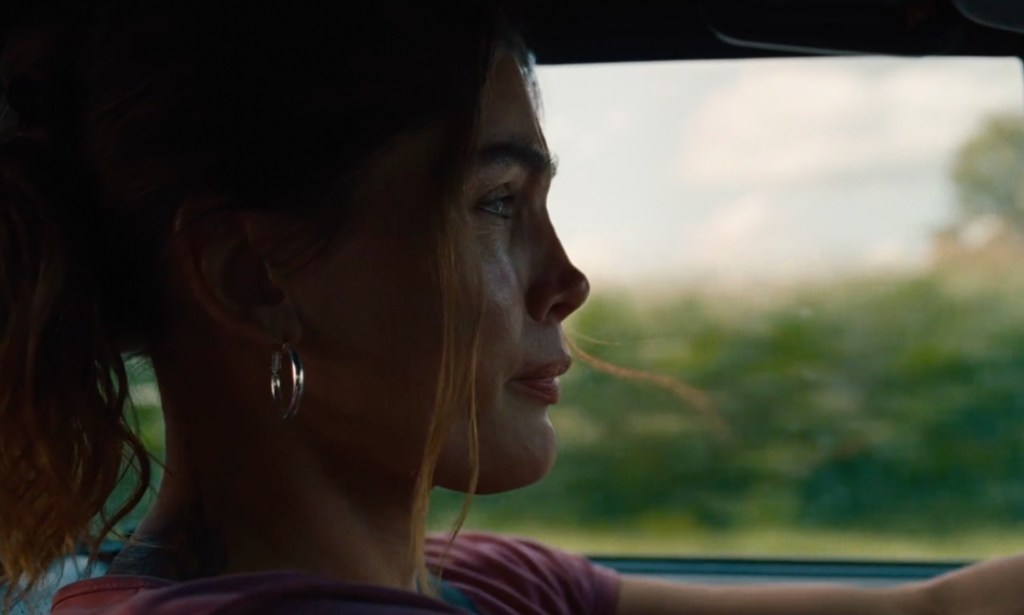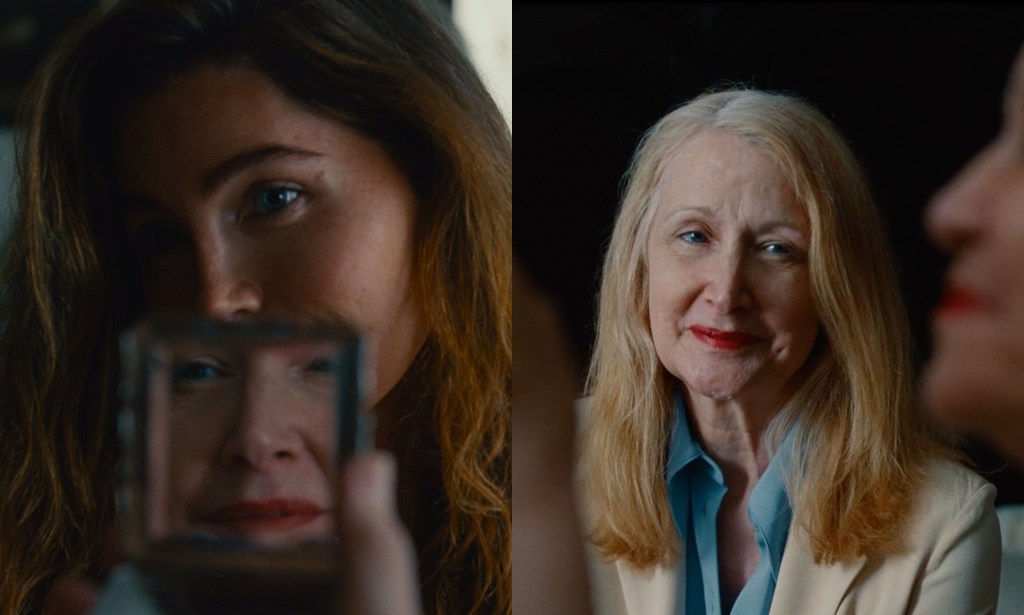Trace Lysette’s poignant drama Monica sees an estranged mother and daughter reconcile their bond

Trace Lysette (R) in Monica. (Andrea Pallaoro)
In the deeply moving LGBTQ+ film Monica, Trace Lysette takes the lead as a trans woman who returns home to a small town to care for her dying mother.
Rewriting the familiar script of trans youth cast out of home for living their truth, director and co-writer Andrea Pallaoro delves into the beauty of family finding each other again.
The trans-led indie film, which premiered at the Venice Film Festival in 2022 and is now screening at the 2023 BFI Flare Festival, stars Trace Lysette as Monica, a Midwestern trans woman who returns home to care for her estranged and ailing mother, Eugenia (Patricia Clarkson).
In the decade that has passed since the pair laid eyes on each other, however, Monica is now unrecognisable to her mother. It soon transpires that Eugenia rejected Monica, who left her home at the very beginning of her transitioning journey. Only now, the pair must attempt to truly see one another, and find an understanding before its too late.
“The film is actually inspired by the story of another very dear friend of mine,” Pallaoro tells PinkNews.
“It all stemmed from a desire to explore the themes of abandonment. The consequences, the complexities, the traumas and the experience of not being understood or accepted for who one is.”
Drawing inspiration from cultural icons across the arts world including Michelangelo Antonioni, Simon Liang, Michael Fassbender, Lucrecia Martel, Virginia Woolf, Susan Sontag and Adrienne Rich, Pallaoro carves out a poignant tale of familial love.
Although the film’s protagonist is trans, Pallaoro emphasises that the emotional arc “is something that we can all relate to, in one way or another. It is really integral to the human experience”.
What does it mean to redefine your relationship with family after coming out? How do you bridge the years of being estranged? Is there ever such as thing as “too late”? These are all questions the viewer is forced to reckon with over the course of the film.

Rare though it is to find nuanced trans stories on screen, it is startlingly refreshing to meet Monica, a woman confident in her identity and ready to confront and heal from her complicated past.
‘From the very beginning she had this strong need to tell this story’
“I was aware from the very beginning there was the opportunity to tell a trans story in a way that we are not used to. We are not focusing on the transition or exile but what it means to reconcile and forgive,” Pallaoro explains.
Monica is an endearingly thoughtful and sincere woman, and in a film filled with heavy silences, Lysette thrives. But finding the perfect person to portray such a complex character was not easy. Pallaoro met over 30 candidates globally before finally discovering Lysette.
Best known for her roles in Amazon Prime series Transparent and Hustlers, she is no stranger to bringing much-needed trans representation to screen.
“It took me over a year to meet Trace and it was lighting from the very first moment,” Pallaoro recalls. “I knew I had found the person that could embark on this journey and sculpt this character. From the very beginning she had this strong need to tell this story.”
Pallaoro also describes how Lysette, a “fierce, courageous and generous actress”, brought her own experiences to the role of Monica.
“Monica happened through so many conversations, moments of sharing and trust as we went on this journey together,” he reflects.

For Pallaoro, the tenderness and rawness with which her story is handled makes Monica a vital watch.
“We are living in a moment where trans lives are under threat more than ever,” he explains. “I’m talking about the new laws that are being passed by the US and all over the world. For an audience to connect with a character like Monica in this moment is so, so important. The spectator has an opportunity to empathise with her and to understand the world through her eyes.
“Possibly even understand themselves better through the process. It goes along way in combating the fear at the base of these new laws.”
Pallaoro’s favourite scene, meanwhile, deals with the challenges of Monica attempting to reconnect with a mother who no longer recognises who she is. After finding the situation too difficult, she drives away to the sound of Pulp’s “Common People”; only for her to make a U-turn and turn back as she decides that she won’t abandon her mother.
‘[Clarkson and Lysette’s] connection so powerful and palpable that the whole crew was weeping’
“Lysette’s psychological acting, the lighting, camera movement, composition – it was one of those moments where every element came together to underline this pivotal moment in the film,” Pallaoro explains.
Clarkson and Lysette’s chemistry is the glue that holds the film together. The precious hesitations, subconscious yearning for connection and heartbreaking acceptance of all the time they have lost transcends the screen.

After meeting Clarkson at a film festivalyears ago, Pallaoro knew she would be the perfect fit for Eugenia. They came together on screen like magic with a “connection so powerful and palpable that the whole crew was weeping.”
There is no moment more bittersweet and touching in the film than the bathtub scene towards the end, by which point Monica and Eugenia have established an unspoken language. Without a single word uttered, we know Eugenia has come to the realisation that her daughter is right in front of her.
“It was a moment I will never ever forget for the rest of my life,” says Pallaora.
In an unrelentingly tough climate, Monica reminds us that even when all feels lost, there is always hope to be found; and as Monica bonds with her nephew Brody, we get a sense of how we can all make the world a better place for the next generation.
“[In the final scene] the way Monica looks at her nephew with so much hope that he will not have to endure the same obstacles and traumas and difficulties,” adds Pallaoro. “The world is changing”.
How did this story make you feel?

